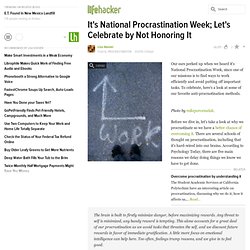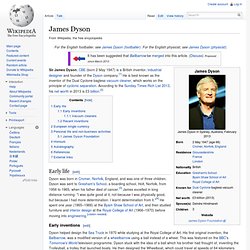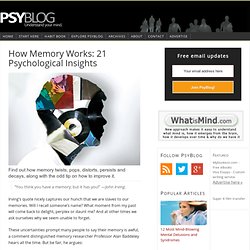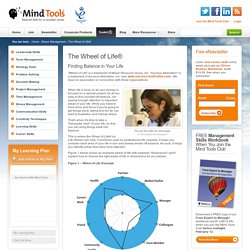

It's National Procrastination Week; Let's Celebrate by Not Honoring It. @Prairie Moon: I actually quit caffeine about a week and half ago and I have to agree that it actually does help with bringing back focus.

I used to drink about 2 cups a day along with 2 cans of diet mt. dew. The withdrawal was a bitch because I did it cold turkey. Having said that I'm actually more energized being off the stuff. It seems counter-intuitive but it works. The Coolest "Extra" Features in Any.DO. What's All the Fuss About Evernote? Should I Be Using It? How to Plan Your Weekly Meals, Stress Free. I've been planning my recipes and doing my shopping for the week ahead for years now.

Awesome idea. One thing I've learned - you just cant set meals for specific days. Even choosing tomorrows meal is a bit wonky. Seven Tips and Tricks to Get More Out of OneNote.
I'm Alexa von Tobel, Founder of LearnVest, and This Is How I Work. James Dyson. Early life[edit] Dyson was born in Cromer, Norfolk, England, and was one of three children.

Dyson was sent to Gresham's School, a boarding school, Holt, Norfolk, from 1956 to 1965, when his father died of cancer.[3] James excelled in long distance running: "I was quite good at it, not because I was physically good, but because I had more determination. I learnt determination from it. "[4] He spent one year (1965–1966) at the Byam Shaw School of Art, and then studied furniture and interior design at the Royal College of Art (1966–1970) before moving into engineering. Early inventions[edit] Dyson helped design the Sea Truck in 1970 while studying at the Royal College of Art. Vacuum cleaners[edit] DC07 Dyson vacuum cleaner In the late 1970s, Dyson had the idea of using cyclonic separation to create a vacuum cleaner that would not lose suction as it picked up dirt. Following his success, other major manufacturers began to market their own cyclonic vacuum cleaners.
Richard branson. Holistic education. Holistic education is a philosophy of education based on the premise that each person finds identity, meaning, and purpose in life through connections to the community, to the natural world, and to humanitarian values such as compassion and peace.

Holistic education aims to call forth from people an intrinsic reverence for life and a passionate love of learning. This is the definition given by Ron Miller, founder of the journal Holistic Education Review (now entitled Encounter: Education for Meaning and Social Justice). The term holistic education is often used to refer to the more democratic and humanistic types of alternative education. Robin Ann Martin (2003) describes this further by stating, “At its most general level, what distinguishes holistic education from other forms of education are its goals, its attention to experiential learning, and the significance that it places on relationships and primary human values within the learning environment.” Philosophical framework[edit] Pomodoro Technique. Time management method A Pomodoro kitchen timer, after which the method is named.
The Pomodoro Technique is a time management method developed by Francesco Cirillo in the late 1980s.[1] The technique uses a timer to break down work into intervals, traditionally 25 minutes in length, separated by short breaks. Each interval is known as a pomodoro, from the Italian word for 'tomato', after the tomato-shaped kitchen timer that Cirillo used as a university student.[2][3] The technique has been widely popularized by dozens of apps and websites providing timers and instructions. Closely related to concepts such as timeboxing and iterative and incremental development used in software design, the method has been adopted in pair programming contexts.[4] Description[edit] There are six steps in the original technique: For the purposes of the technique, a pomodoro is the interval of time spent working.[1] Cirillo suggests: Tools[edit] Variations[edit] Elon Musk.
How Memory Works. Find out how memory twists, pops, distorts, persists and decays, along with the odd tip on how to improve it.

“You think you have a memory; but it has you!” —John Irving. Irving’s quote nicely captures our hunch that we are slaves to our memories. Will I recall someone’s name? What moment from my past will come back to delight, perplex or daunt me? These uncertainties prompt many people to say their memory is awful, a comment distinguished memory researcher Professor Alan Baddeley hears all the time. “I have a good memory and would argue, despite its occasionally embarrassing fallibility, that both my memory and yours exceed that of the best computer in terms of capacity, flexibility, and durability.”
The Wheel of Life - Finding Balance in Your Life - Time Management Techniques from MindTools. Finding Balance in Your Life "Wheel of Life" is a trademark of Meyer Resource Group, Inc.

"Success Motivation" is a trademark of Success Motivation, Inc. (see www.success-motivation.com). We have no association or connection with these organizations. Put your life under the microscope. © iStockphoto/Snowleopard1. 5 Tricks To Hack Your Way To Better Life Habits.